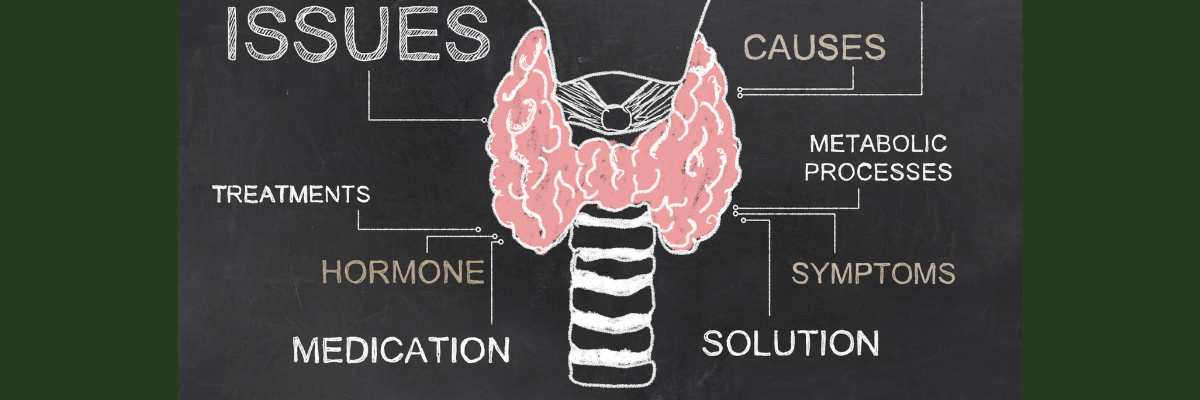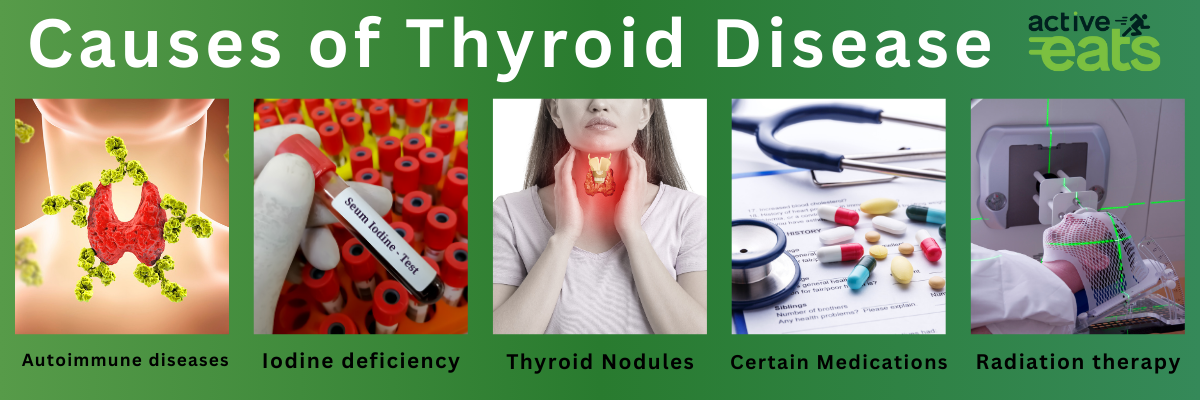Welcome to our blog post on understanding the thyroid disease ! Thyroid is a small butterfly-shaped gland located at the centre of your neck that plays a crucial role in many crucial body functions. In this article, we will learn about the causes and symptoms of thyroid disease, and provide insights into its treatment and management. So, let’s begin to gain a better understanding of this vital gland!
Demystifying the Thyroid: Understanding Thyroid Hormones
Have you ever wondered what exactly the thyroid does and why it is so important for our overall health? In this section, we will delve into the fascinating world of thyroid hormones and uncover their role in our body.

There are two types of thyroid hormones, namely triiodothyronine (T3) and thyroxine (T4), that are produced by the thyroid glands. These hormones are responsible for controlling our metabolism, body temperature, heart rate, and energy levels.
How do thyroid hormones affect metabolism and energy levels?
Thyroid hormones act as a kind of “gas pedal” for our bodies, determining the speed at which our cells work. They manage the rate of metabolic processes in our body that convert food into energy. A proper balance of thyroid hormones is essential for maintaining an efficient metabolism and sustaining adequate energy levels.
The types of thyroid hormones and their functions
T3, the more active form of thyroid hormone, is responsible for directly influencing the body’s metabolism and energy levels. T4, on the other hand, acts as a precursor to T3 and is converted into the active form when needed. Both T3 and T4 work together to ensure the proper functioning of various organs and systems in our body.
Why is it important to maintain a balance of thyroid hormones?
Thyroid hormones affect almost every cell in our body. Health issues like weight gain or weight loss, fatigue, mood disturbances, and even heart problems are common due to imbalance of thyroid hormones.
How does an imbalance of thyroid hormones lead to health issues?
An underactive thyroid is known as hypothyroidism which occurs when the thyroid gland doesn’t produce enough hormones resulting in a slowdown of bodily functions, causing symptoms such as weight gain, fatigue, dry skin, and depression.
On the other hand, an overactive thyroid, or hyperthyroidism, occurs when the thyroid gland produces an excess of hormones, leading to symptoms like weight loss, rapid heart rate, anxiety, and irritability.
Unveiling the Silent Culprits: Causes of Thyroid Disease
Thyroid disease can be attributed to several factors, including:

- Autoimmune diseases, such as Hashimoto’s thyroiditis and Graves’ disease
- Iodine deficiency
- Thyroid nodules or goiter
- Certain medications
- Radiation therapy
Additionally, genetics play a significant role in the development of thyroid disease. If you have a family history of thyroid disorders, you may be at a higher risk of developing them yourself.
Several lifestyle factors can contribute to thyroid disease, including:
- Poor diet and nutrient deficiencies
- Excessive stress levels
- Lack of exercise
- Environmental toxins
- Certain medications or supplements
Environmental factors, such as exposure to pollutants, chemicals, and radiation, can disrupt thyroid function and contribute to the development of thyroid disease.
Decoding the Warning Signals: Symptoms of Thyroid Disease
Thyroid disease can manifest in various symptoms that can greatly impact one’s daily life. Here are some common symptoms of thyroid disease:
Common symptoms of an underactive thyroid:
- Unexplained weight gain
- Fatigue and feeling sluggish
- Sensitivity to cold
- Dry skin and hair
- Muscle weakness
- Constipation
- Depression
Signs that indicate an overactive thyroid:
- Unintentional weight loss
- Rapid or irregular heartbeat
- Sweating excessively
- Anxiety and irritability
- Tremors in the hands or fingers
- Difficulty sleeping
- Frequent bowel movements
Thyroid dysfunction can also impact one’s mood and mental health. Symptoms such as anxiety, depression, irritability, and difficulty concentrating may be present in individuals with thyroid disease.
Common treatment options for hypothyroidism:
Levothyroxine: Its a synthetic thyroid hormone given for underactive thyroid. It helps to replace the insufficient thyroid hormones and restore normal levels in the body.
Liothyronine: Generally liothyronine is combined with levothyroxine to improve symptoms and optimize thyroid hormone levels.
Natural Desiccated Thyroid (NDT): Derived from pig thyroid glands, NDT contains a mixture of thyroid hormones and can be an alternative option for those who do not respond well to synthetic hormones.
Common Treatment options for hyperthyroidism:
Methimazole: This medication blocks the production of thyroid hormones and is often used as a first-line treatment for hyperthyroidism.
Propylthiouracil (PTU): PTU works similarly to methimazole and can be an alternative option.
Beta blockers: These medications help manage symptoms such as heart palpitations, tremors, and anxiety while the underlying thyroid condition is being treated.
The role of diet and lifestyle changes in managing thyroid disease:
Although diet and lifestyle changes alone may not cure thyroid disease, but they do help in managing symptoms and optimizing overall health. Some of the diet and lifestyle changes are:
Avoiding certain foods: Goitrogenic foods are those food items which interfere with normal thyroid function such as cruciferous vegetables.
Ensuring adequate iodine intake: Iodine is essential for thyroid hormone production. In cases of iodine deficiency, supplementation or dietary changes may be necessary.
Maintaining a healthy weight: Achieving and maintaining a healthy weight can help regulate hormone levels.
Reducing stress: Chronic stress can negatively impact thyroid function. Engaging in stress-reducing activities, such as exercise, meditation, and relaxation techniques, can be beneficial.
Alternative therapies for thyroid disease:
In addition to conventional treatments, some individuals explore alternative therapies to complement their thyroid disease management:
Acupuncture: This traditional Chinese practice involves the insertion of thin needles into specific points on the body. Some individuals find that acupuncture helps alleviate symptoms and improve overall well-being.
Herbal supplements: Certain herbs, such as ashwagandha and guggul, have been used in traditional medicine to support thyroid health. However, it’s important to consult with a healthcare professional before incorporating any supplements.
Remember, the most effective treatment will vary depending on the individual and their specific thyroid condition.
A Balancing Act: Comparing Thyroid in Men and Women
Thyroid Stimulating Hormone (TSH): TSH is produced by the pituitary gland and stimulates the thyroid to produce T4 and T3. In general, women tend to have higher TSH levels than men
Free T4 and Free T3: Free T4 and Free T3 are the active forms of thyroid hormones that circulate in the blood and exert their effects on the body. Women typically have higher levels of both Free T4 and Free T3 compared to men. This may be influenced by estrogen, as it enhances the liver’s ability to produce proteins that transport thyroid hormones in the blood.
Thyroid Binding Globulin (TBG): TBG is a protein that binds to thyroid hormones in the blood, affecting their availability to cells. Levels of TBG can be influenced by estrogen and other hormones. Women, especially during pregnancy and while taking hormonal contraceptives, may have higher levels of TBG, leading to increased total thyroid hormone levels.
Age-related Differences: In general, thyroid function tends to decline with age. Postmenopausal women may experience changes in thyroid hormone levels, and the risk of thyroid disorders such as hypothyroidism increases with age.
20 Telltale Signs of Thyroid Disease: Don’t Ignore the Clues
Common signs and symptoms of thyroid disease:
- Unexplained weight changes
- Fatigue and low energy levels
- Difficulty sleeping
- Irritability and mood swings
- Changes in appetite
- Thinning hair and brittle nails
- Dry skin
- Muscle aches and weakness
- Constipation
- Irregular menstrual periods
- Lesser-known signs that may indicate an underlying thyroid issue:
- Hoarse voice
- Swelling in the neck
- Sensitivity to cold or heat
- Changes in heart rate
- Difficulty concentrating
- Memory problems
- Depression
- Anxiety
- Muscle cramps
- Tingling or numbness in the hands or feet
If you notice any of these signs or symptoms, it’s important not to ignore them. Remember, early detection and treatment plays a crucial role in managing thyroid disease effectively and improving overall well-being.
Empowering Awareness: Breaking the Silence on Thyroid Disease

Thyroid disease affects millions of people around the world, yet it often goes undiagnosed or untreated. There are many misconceptions about thyroid health that contribute to the lack of awareness. For instance, some people believe that thyroid issues only affect women or that it’s just a minor inconvenience. The truth is that thyroid disease affects lots of body functions impacting overall well-being and quality of life.
Leaving thyroid disease undiagnosed can lead to a range of health issues, including weight gain or weight loss, fatigue, mood swings, hair loss, infertility, and even cardiovascular problems.
By breaking the silence and empowering awareness about thyroid disease, we can make a difference in the lives of those affected by this condition. It’s time to come together, educate others, and support one another on this journey to better thyroid health and overall well-being.
Tips for managing thyroid disease and maintaining overall well-being:
- Stay consistent with your medication: Take your prescribed medication as directed by your healthcare provider. This will help regulate your thyroid hormone levels and alleviate symptoms.
- Prioritize self-care: Make time for activities that bring you joy and relaxation. Engage in hobbies, practice mindfulness, or indulge in self-care practices such as meditation or yoga.
- Eat a balanced diet: Opt for nutrient-rich foods that support thyroid health. Include sources of iodine, selenium, and zinc in your diet, as these are important for thyroid function.
- Get regular exercise: Engage in physical activity to improve metabolism and boost energy levels. Consult with your healthcare provider for suitable exercises based on your condition.
- Manage stress: Stress can worsen thyroid symptoms. Find healthy coping mechanisms like deep breathing exercises, journaling, or talking to a therapist to manage stress effectively.
- Educate yourself: Keep yourself informed about thyroid disease and its management. Stay up to date with the latest research and seek reliable sources of information.
Remember, it’s important to listen to your body and adjust your lifestyle accordingly. Every individual’s journey with thyroid disease is unique, so find what works best for you. With the right mindset and support, you can live your life to the fullest despite thyroid disease.
Conclusion
In conclusion, understanding the thyroid and its impact on our overall health is crucial. As we have explored throughout this blog post, thyroid hormones play a vital role in metabolism, energy levels, and various bodily functions. Imbalances in thyroid hormones can lead to a range of health issues, including thyroid disease.
We have delved into the causes, symptoms, and treatment of thyroid disease, shedding light on the importance of early detection and proper management. By recognizing the signs and seeking medical attention when necessary, individuals can take control of their thyroid health and improve their quality of life.
It is essential to remember that both men and women can be affected by thyroid disease, although women are more prone to developing thyroid disorders. Throughout different stages of life, such as pregnancy, thyroid function can fluctuate, further emphasizing the importance of vigilance and regular check-ups.
Raising awareness about thyroid disease is crucial to break the silence surrounding this often-misunderstood condition. By dispelling myths, supporting individuals with thyroid disease, and advocating for resources and better understanding, we can empower those living with thyroid disease to thrive.
Living life to the fullest with thyroid disease is possible with proper management, self-care practices, and a balanced lifestyle. By taking care of our overall well-being, both physically and emotionally, we can navigate the challenges of thyroid disease and find inspiration in the stories of those who have thrived despite their diagnosis.
In conclusion, let us continue to educate ourselves and others about thyroid health, support those impacted by thyroid disease, and work towards a future where everyone can live their best life, thyroid included.


What our Body Nails Indicate? - coachactiveeats.com
[…] Hypothyroidism: Deficiency of thyroid hormone may lead to brittle nails. […]
Delightful Dried Fruits - coachactiveeats.com
[…] Dried Fruits for Cholesterol and Thyroid […]